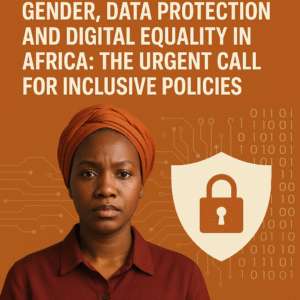
Explore how gender inequality and privacy challenges affect African women in the digital age. Learn how AI, surveillance, and weak data protection laws increase vulnerability, and discover what Africa can learn from feminist data governance and global standards.
The rapid advancement of digital technologies has revolutionized the way personal data is collected, stored, and shared. From mobile apps and smart devices to AI-driven platforms, data is constantly being exchanged across digital systems. However, while this technological progress offers immense benefits, it also raises urgent concerns around privacy, surveillance, and gender-based discrimination, particularly in Africa. In regions where women and gender-diverse people already face structural disadvantages, data protection and privacy violations can deepen inequality and expose them to serious harm. Understanding how digital systems interact with gendered realities is essential for building inclusive, equitable, and safe digital environments across the continent.
How Privacy Gaps and Digital Bias Harm African Women
In Africa, where internet access is rapidly expanding, the lack of comprehensive data protection laws leave women especially vulnerable. Personal data, such as names, images, health status, sexual orientation, or location, can be misused in ways that reinforce gender-based violence and discrimination. For example, surveillance tools are often used to track, monitor, or silence women. Online harassment and cyberbullying disproportionately affect women whose data is more likely to be exposed or exploited. Automated algorithms, based on biased data sets, have denied women, particularly Black women access to jobs, loans, or healthcare. These risks are heightened by social, cultural, and legal contexts that stigmatize gender diversity. In some cases, the public exposure of sensitive data has resulted in social exclusion, violence, or imprisonment.
How AI and Emerging Technologies Increase Gendered Harms
As artificial intelligence becomes central to decision-making in public and private sectors, African women face a new level of digital exclusion. AI tools that are trained on historically biased data can replicate and intensify discrimination in access to financial services, employment, healthcare, or social welfare. For instance, algorithms used in credit scoring often exclude women from traditional data sets, especially those without formal employment, leading to unfair loan denials. Moreover, biased content moderation systems may disproportionately silence women or gender-diverse people when they express views that challenge dominant norms. This creates an uneven digital space where some voices are amplified while others are silenced.
Toward a Feminist Framework for Data Protection in Africa
To address these challenges, African policymakers and institutions need to adopt a feminist approach to data governance. This involves recognizing the ways in which data practices are shaped by social inequalities, and ensuring that data protection laws are inclusive, context-aware, and human rights-based. The Feminist Principles of the Internet, first drafted in 2014 by the Association for Progressive Communications, offer a useful framework. These principles promote a digital environment that respects privacy, safeguards identity, and protects against all forms of surveillance and discrimination. The principle on privacy urges a shift away from viewing data as a commodity, and toward treating it as a matter of dignity, autonomy, and safety.
A Call to Action for Inclusive Data Governance
For Africa to truly benefit from digital transformation, gender-sensitive data protection policies must become a priority. The challenges that African women face in the digital space are not merely technical; they are deeply rooted in power, access, and inequality. By drawing on feminist frameworks, adopting inclusive laws, and learning from global best practices, Africa can shape a future where technology serves everyone equally.
Keywords: gender and data protection in Africa, African women and digital privacy, AI discrimination against women, feminist data governance, online gender-based violence, and gender, inclusive tech policy Africa, privacy rights for African women, intersectional data protection